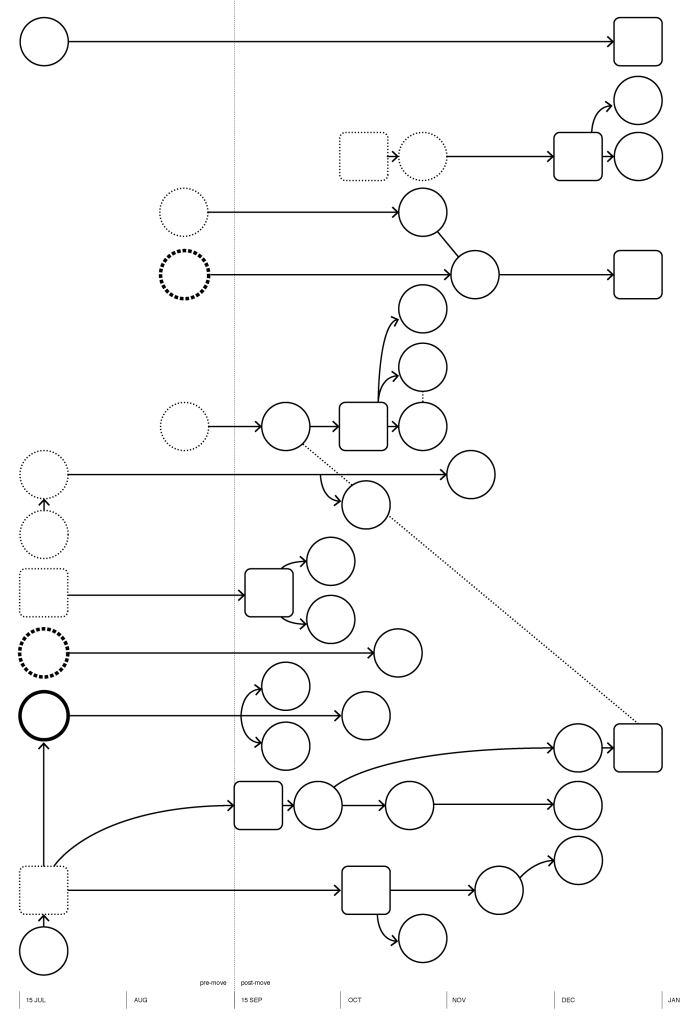Hard to believe that I’ve already been in London for 3 months! Thanks to all of you who have shown interest in participating in The Reliants Project. If you haven’t already, you can read more about this personal project in my previous post. If you’re just learning about the project and interested in tracking your connections, reach out to our community through this typeform.
reliant /re·li·ant/ noun.
1. a British car manufacturer.
2. a person on which someone depends.
At this point I’m trying to focus on the connections made outside of work, so I am not including colleagues in the statistics or visualisation unless they’ve had a direct impact on my meeting others beyond the office. While it’s still early days, here are some basic statistics thus far:
- Existing local network: 13 (not work colleagues)
- Events attended: 11 (3 work-related)
- Organisations joined: 2 (1 fitness-related, 1 hobby-related)
- New connections made: 25 (individuals that I’ve had regular contact with since meeting, also not work colleagues)
- Existing network that has moved to London: 2
- Existing network that has left London: 2
- New reliants: 1
Below is the visualisation I created of the 2 months preceding my move and the first 3 months after my arrival in London. The data has been anonymised by removing the labels. The connections are categorised into 4 groups: local contacts, non-local contacts, local reliants and non-local reliants. At them moment, the contexts are organised loosely into 2 groups: local and non-local. If I meet someone randomly outside of a structured interaction, I just note the situation rather than attribute it to an organisation or event. Even if I met someone prior to July 2015, I still place them on the far left of the diagram. For now, known mutual connections are indicated with either a dotted or solid line (depending on whether I made the introduction or it pre-dated me knowing either individual). The diagram doesn’t keep track of frequency of interactions and I don’t include new connections if there’s no real initiative to maintain contact (ie. attended a party where I met many individuals, but only exchanged contact details with 2 of them, making plans to meet again).
Here are a few initial observations from the data, some of which I find surprising.
An existing network doesn’t always translate to new connections. Of the 13 people I knew before moving to London, only one has introduced me to others. Interestingly, that person is the individual I met most recently before making the move. In fact, I have yet to connect with some of my existing network even though I’ve been here for months. Life stage seems to play an important role in whether scheduling those opportunities takes priority. When I do spend time with those existing connections, it’s almost always one-on-one.
Connecting with “power networkers” accelerates the process. There are certain people who seem to speed up this process, either by making direct connections themselves or suggesting events/organisation where like-minded people are likely to gather. While it’s still early, I think I’ve met 4 such people thus far, whom have been responsible for 40% my new connections. Those “power networkers” won’t necessarily become reliants, but they seem to be extremely important for a healthy network. Events recommended or hosted by them result in about 3 new connections, while other events often result in 0-1.
Expect a role change from provider to receiver. While I was often the person making introductions in Hong Kong, I have only made 3 introductions in London thus far. This role reversal is not particularly surprising to me, but I wonder if/when that role will transition back to it’s former state.
No doubt, it’s been fascinating to identify these patterns and I can’t wait to see what the next 3 months will bring. I welcome any comments or suggestions and would love to hear how others are getting on.



Pingback: The Reliants Project: 6 months | with ease
Pingback: The Reliants Project: 12 months | with ease